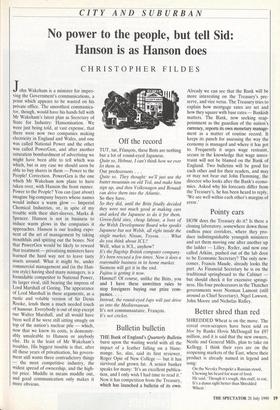Bulletin bulletin
THE Bank of England's Quarterly Bulletin burst upon the waiting world with all the impact of a feather falling on a blanc- mange. So, alas, said its first reviewer, Roger Opie of New College — but it has survived and grown fat. A senior banker speaks for many: 'It's an excellent publica- tion, and I only wish I had time to read it.' Now it has competition from the Treasury, which has launched a bulletin of its own.
Already we can see that the Bank will be more interesting on the Treasury's pre- serve, and vice versa. The Treasury tries to explain how mortgage rates are set and how they square with base rates — Bankish matters. The Bank, now seeking reap- pointment as the guardian of the nation's currency, reports its own monetary manage- ment as a matter of routine record. It keeps its punch for assessing the way the economy is managed and where it has got to. Frequently it urges wage restraint, secure in the knowledge that wage unres- traint will not be blamed on the Bank of England. Two bulletins will be good for each other and for their readers, and may of may not bear out John Flemming, the director who looks after the Bank's econo- mics. Asked why his forecasts differ from the Treasury's, he has been heard to reply, 'We are well within each other's margins of error.'


















































 Previous page
Previous page